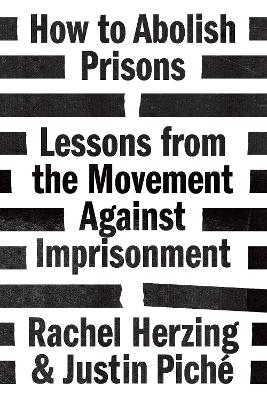
How to Abolish Prisons
Lessons from the Movement Against Imprisonment
Seiten
2023
Verso Books (Verlag)
978-1-78663-277-7 (ISBN)
Verso Books (Verlag)
978-1-78663-277-7 (ISBN)
- Noch nicht erschienen
- Portofrei ab CHF 40
- Auch auf Rechnung
- Artikel merken
What is prison abolition and how do we get there?
Following some of the largest protests the US has seen in many years, police and prison abolition have become urgent issues of our time. As this book reveals, this marks a return: In the 1960s and 1970s, groups like the U.S. Prison Research Education Action Project and the Norwegian Association for Penal Reform advocated for a world without prisons. Instead, incarceration boomed, growing in the United States from about 200,000 prisoners to unprecedented 2 million and more. Now, grassroots movements and critical research are converging on an uncompromising critique of the regime of mass incarceration.
This book provides a trenchant guide to prison abolition, explaining why the solution to the criminal justice crisis is ending policing, imprisonment, and mass surveillance, and building a society that creates alternatives to punishment and carceral solutions to social contradictions. The book details and evaluates on-the-ground abolitionist projects throughout North America that provide alternative models, and reveals what it means to work for abolition today.
Following some of the largest protests the US has seen in many years, police and prison abolition have become urgent issues of our time. As this book reveals, this marks a return: In the 1960s and 1970s, groups like the U.S. Prison Research Education Action Project and the Norwegian Association for Penal Reform advocated for a world without prisons. Instead, incarceration boomed, growing in the United States from about 200,000 prisoners to unprecedented 2 million and more. Now, grassroots movements and critical research are converging on an uncompromising critique of the regime of mass incarceration.
This book provides a trenchant guide to prison abolition, explaining why the solution to the criminal justice crisis is ending policing, imprisonment, and mass surveillance, and building a society that creates alternatives to punishment and carceral solutions to social contradictions. The book details and evaluates on-the-ground abolitionist projects throughout North America that provide alternative models, and reveals what it means to work for abolition today.
Rachel Herzing is executive director of the Center for Political Education. She was a cofounder of Critical Resistance and a Soros Justice Fellow of the Open Society Foundations. Justin Piché is an Assistant Professor in the Department of Criminology at the University of Ottawa and co-editor of the Journal of Prisoners on Prisons. He is a recipient of the Aurora Prize from the Social Sciences and Humanities Research Council of Canada, which "recognizes an outstanding new scholar who is building a reputation for exciting and original research in the social sciences and humanities". He lives in Ottawa.
| Erscheint lt. Verlag | 5.9.2023 |
|---|---|
| Vorwort | Mariame Kaba |
| Verlagsort | London |
| Sprache | englisch |
| Maße | 129 x 198 mm |
| Gewicht | 200 g |
| Themenwelt | Recht / Steuern ► Strafrecht ► Kriminologie |
| Sozialwissenschaften ► Soziologie | |
| ISBN-10 | 1-78663-277-2 / 1786632772 |
| ISBN-13 | 978-1-78663-277-7 / 9781786632777 |
| Zustand | Neuware |
| Haben Sie eine Frage zum Produkt? |
Mehr entdecken
aus dem Bereich
aus dem Bereich
Wie ich als Kopf einer der meistgesuchten Verbrecherbanden mit …
Buch | Hardcover (2023)
riva (Verlag)
CHF 29,90


